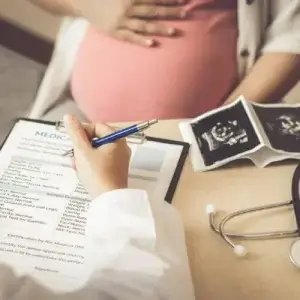Home / Compare Travel Insurance / Travel insurance for pre…

Key takeaways
Whether you still need to travel for work or want to head on a babymoon to celebrate the new arrival, there’s plenty of reasons to travel while pregnant. Whatever the case, you should always consider travel insurance before leaving Australia. We’ll help you understand how your pregnancy affects your cover.
- Travel insurance with pregnancy cover will only cover the expenses of the insured mother, not the child; this does not include costs relating to premature birth or care of a newborn child.
- Some policies may consider pregnancy a pre-existing medical condition. Make sure you get a policy that covers pre-existing conditions and always declare these when applying for your travel insurance. This will ensure you have the cover you need and there are no surprises if you’re injured or become ill while travelling.
- Your policy will cover more than just your pregnancy. A comprehensive policy can cover you against unexpected injuries, travel delays and cancellations, lost or stolen luggage and more.
Expert tips for choosing travel insurance when pregnant
Our Executive General Manager of General Insurance, Adrian Taylor, has some top tips for helping you choose a suitable travel insurance policy that covers your pregnancy.

Compare coverage before purchasing
Pregnancy cover can differ quite a lot between insurers. Some may cover only up to the 18th week of gestation, while others will cover up to 30 weeks. Cover also varies between natural pregnancies and assisted pregnancies, and again between single and multiple pregnancies.
Purchase travel insurance as soon as you book
Purchase your travel insurance as soon as you pay any deposit for accommodation or travel, or even before booking. By doing so, any cancellation fees may be covered if you need to cancel your trip due to unforeseen circumstances, such as pregnancy complications.
Consider a family travel insurance policy
If you’re travelling with a partner and other children, you may want to consider a family insurance policy. This type of travel insurance cover protects your family (including your spouse, dependent children and yourself) under one policy that has higher cover limits for the number of travellers covered. However, it’s important to remember that childbirth and newborn babies are generally not covered under any travel insurance policy.
Getting travel insurance when pregnant
Does travel insurance cover pregnancy?

The good news is that you can still get a travel insurance policy if you’re pregnant, depending on how far along you are. However, it’s important to remember that most insurers will only cover single, uncomplicated pregnancies following natural conception.
Some insurance companies will cover pregnancies up to 30 weeks (if you meet certain conditions), while other insurance providers will only offer cover up to somewhere between 18 to 26 weeks pregnant.
Is pregnancy a pre-existing medical condition?
When it comes to travel insurance, pregnancy is not generally considered a pre-existing condition if you (the insured) are pregnant when you take out your policy, but it will depend on the insurer. Typically, you won’t have to declare your pregnancy if you’re under 18-26 weeks pregnant for a single pregnancy, depending on the policy you choose.
However, if you suffer from any known pregnancy complications or related pre-existing conditions, you’ll need to declare these to your insurer. These might include pre-eclampsia, gestational diabetes or high blood pressure. Your policy may be able to cover these conditions in case you need medical treatment or emergency assistance overseas, or you may be able to pay an additional premium to ensure you have the coverage you need.
Do I need travel insurance for my pregnancy?
Travel insurance is designed to provide financial protection for when things don’t go quite as planned on your trip, like a medical emergency or travel delay. Travelling while pregnant can come with added risks, not to mention stress. That’s why it’s important for expectant mothers to take out a travel insurance policy.
Travel insurance can cover you while pregnant and provide you with peace of mind. However, most policies won’t provide cover for any expenses incurred if your baby is born prematurely and won’t cover medical expenses related to regular antenatal care. Remember, you may need to submit a medical assessment of your pregnancy when applying for cover, so your insurer can decide whether your policy covers your condition.
Inclusions and exclusions
What should a travel insurance policy for pregnancies include?

Travel insurance for pregnancy offers the same benefits as any other travel insurance, including cover for medical emergencies, evacuation or repatriation, trip delays or cancellations, lost luggage or personal items, theft and rental car excess. This means that you’d typically be covered for:
- Unexpected pregnancy-related complications for a limited period (i.e. up to 23 weeks for many policies, but this cover varies between insurers).
- Overseas emergency medical care and hospital expenses if you suffer from an unexpected illness, complication or serious injury related to your pregnancy.
- Trip cancellation cover if your doctor advises you’re not fit to travel because of complications or the risk of childbirth.
- 24-hour emergency assistance.
As with any travel insurance product, the level of cover for pregnancy will vary between insurers and policies. So, before you make a decision, read through the terms and conditions and be sure you understand the limits, sub-limits and exclusions. You can find all these details and more in your policy’s Product Disclosure Statement (PDS) and Target Market Determination (TMD).
What is excluded from travel insurance with pregnancy cover?
It’s important to remember that travel insurance policies come with exclusions and that cover for pregnancy comes with conditions. As such, it’s crucial you understand what you are and aren’t covered for before you purchase a policy. As a general rule, pregnant travellers may not be covered if:
- You conceived through an assisted fertility treatment such as IVF
- You need to claim for expenses related to childbirth or the healthcare of a newborn
- You travel against medical advice from your doctor
- You’re having multiple babies such as twins or triplets
- You’re planning to travel after the maximum weeks of pregnancy permitted (typically during the third trimester, but this will vary by insurer)
- You’ve experienced complications of pregnancy (including prior miscarriages, ectopic pregnancies or premature labour)
- You try to claim routine doctor check-ups for your pregnancy while overseas.
Carefully read through the PDS before signing up to a policy to know what you’re covered for. Similarly, check with your airline or cruise operator to ensure they don’t have their own restrictions on pregnant women flying or sailing.
Travel suitability during the trimesters
First trimester

The first 12 weeks of your pregnancy are crucial for your baby’s development, and you’ll finish it with a maternal blood test and an ultrasound.1 While it’s typically a safe enough time to travel, you may be experiencing some regular morning sickness during this trimester. Because of this, you may want to consider scheduling any trips until after the 12th week.
Second trimester
Now is a great time to have a babymoon, because the second trimester is the safest time for you to travel (so long as you’re not experiencing any complications).2 Consult your doctor before you make any travel arrangements, as they will be able to give you the best advice for your situation, including any vaccines you may need on your travels.
Third trimester
Some airlines may not let you fly if you’re far into your third trimester, or if the flight time exceeds a certain length (e.g. four hours). Even if they allow you to fly, you may still need to produce a note from your doctor stating that you’re fit to travel. When it comes to travel insurance for pregnancy, some insurers only provide cover up to the 26th week, so if it’s just for leisure, you should reconsider any travel plans.
Meet our travel insurance expert, Adrian Taylor
As a General Insurance expert with over 13 years’ experience in financial services, Adrian Taylor believes in educating customers about the importance of travel insurance so that anyone can kick back and make the most of their time away from home. While no one wants a disrupted holiday, a suitable travel insurance policy can provide a financial safety net for yourself, your belongings and your trip in case things go wrong.
Want to know more about travel insurance?
1 Victoria State Government – Better Health Channel. Pregnancy – week by week. Accessed August 2023.
2 Victoria State Government – Better Health Channel. Pregnancy and travel. Accessed August 2023.


